Plant Sciences Institute Advisory Board 12
(Advisory Board members sorted by last name in alphabetical ascending order)
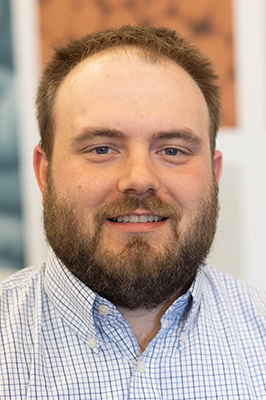
Matthew Carroll, Ph.D.Analytics & Insights LeadMatt is the lead for Analytics and Insights team in RCFI. Matt and his team are responsible for working with the research and conservation teams to analyze data, generate reports, develop tools and generate insights from ISA's on-farm research activities. Matt works with other RCFI leads and directors to review proposed research and manage projects. He reviews experimental designs and analysis of data to ensure data meets ISA quality standards.
Matt is from Elizabeth, Illinois where his family farms. They raise soybeans, corn and beef cattle. Matt attended Iowa State University where he received a Bachelor's of Science in Agronomy and Genetics and then went on to earn his Ph.D. in Plant Breeding.
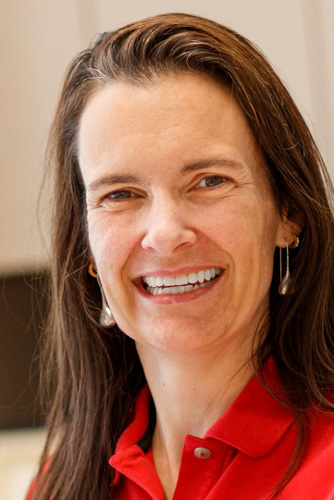
Jennifer L. Clarke, Ph.D.Director, Quantitative Life sciences InitiativeProfessor, Food Science and Technology, StatisticsJennifer Clarke is a Professor in Food Science and Technology, and Statistics, and the Director of the Quantitative Life Sciences Initiative at the University of Nebraska-Lincoln. Clarke received her undergraduate degrees in Mathematics and Psychology from Skidmore University, a M.S. in Statistics from Carnegie Mellon University, and a doctorate in Statistics from The Pennsylvania State University. She serves as Chair of the Seed Grant Steering Committee of the Midwest Big Data Hub, Chair of the North American Plant Phenotyping Network, and Academic Chair of the International Plant Phenotyping Network. She is Director of the Ph.D. program in Complex Biosystems at the University of Nebraska-Lincoln, an interdisciplinary graduate program at the nexus of the life and data sciences. She is leading efforts to develop a blueprint for a National Agricultural Producers Data Cooperative for the USDA. Her current interests include statistical and AI methodology for robust prediction and training the next generation of data scientists.
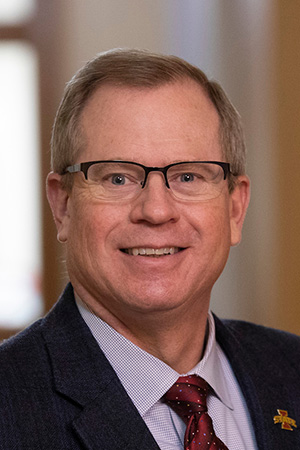 ex-officio
ex-officio
Peter K. Dorhout, Ph.D.Vice President for Research, Office of the Vice President for ResearchPeter K. Dorhout brings a tremendous depth of experience and an impressive portfolio of professional accomplishments to his role as the Vice President for Research at Iowa State University.
Peter joined Iowa State in January 2021, picking up the mantle of leadership from former VPR Sarah Nusser and interim VPR Guru Rao. In his previous role as VPR and professor of Chemistry at Kansas State University, Peter established a rock-solid reputation as a strong collaborator and forward-thinking leader. He is committed to partnering with faculty and staff scientists, – as well as graduate students and postdoctoral scholars – to help them advance Iowa State's mission to create, share, and apply knowledge to benefit our world.
Among his many professional accomplishments, Peter is a fellow of the American Association for the Advancement of Science and the American Chemical Society, where he also served as President. He holds a bachelor's degree in Chemistry from the University of Illinois at Urbana-Champaign and a Ph.D. in inorganic chemistry from the University of Wisconsin-Madison. Peter is no stranger to Ames and Iowa State, having completed a postdoctoral assignment with the university and the U.S. Department of Energy Ames Laboratory, serving with Distinguished Professor Emeritus John Corbett.
An Eagle Scout, Peter serves as president of the executive board of the Coronado Area Council Boy Scouts of America. He also serves on the Research Corporation for Science Advancement board of directors and is a life member of the Society for the Advancement of Chicanos/Hispanics and Native Americans in Science (SACNAS).
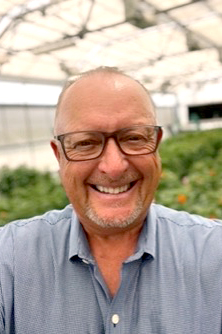
John A. Greaves, Ph.D.Vice President (Worldwide), Specialty CropsJohn A. Greaves is the vice president, responsible for specialty crops and plant science at Kemin Industries, Inc., in Des Moines, Iowa. Kemin is a privately held international life science company providing innovative molecular solutions to the animal feed ingredient, food ingredient, human nutraceutical, pet food, textile and specialty crop protection industries, worldwide. Approximately 40% of Kemin's sales are derived from products that use bioactive molecules from plants as the primary active ingredients. In his current role, John coordinates a global team of plant breeders, plant biologists, analytical chemists, extraction chemists, research agronomists and field agronomists; and reports directly to Kemin's CEO. Research, breeding and crop scale-up programs are located in the USA, Europe, China, India, Chile, Mexico, Brazil and South Africa, using plants to produce key target molecules such as antioxidants, preservatives, antimicrobials, surfactants, carotenoids, cannabinoids and bioactive proteins via conventional and marker-assisted (non-GMO) plant breeding methods. Kemin's domestic
molecular farmingoperations include over 2,000 field acres and just under 2 acres under glass; with an additional 20,000 acres internationally. Novel crops and cropping systems are developed in a fully vertically integrated, increasingly certifiedsustainably grownsystem around the world and extracted to generate innovative new products.John began his career at Kemin in 1996 as director of R&D. He has served in multiple executive leadership positions at Kemin and among his accomplishments, is responsible for establishing Kemin's worldwide leadership position in rosemary as a source of natural antioxidants. Prior to joining Kemin, John was manager of trait breeding at ICI Seeds in the USA (now Syngenta). John is a native of Lancaster in the northwest of England. He graduated with a B.S. (Honors) degree in 1984 (Agricultural Botany); and a Ph.D. degree in 1987 (Plant Physiology), both from the University of Wales in the United Kingdom. John moved to the USA in 1988 with ICI.
John currently serves on the board of advisors of the Iowa State University Plant Sciences Institute, BioConnect Iowa, and the Greater Des Moines Botanical Garden. He has also served as an independent board director for a prominent sorghum seed company. John has received several honors including the Iowa
Da Vinci Award;the Iowa Governor's Volunteer Award and the Iowa Futures Award for services to education. He is an inventor on over 16 U.S. and international issued patents. John and his wife live in Ankeny, Iowa.
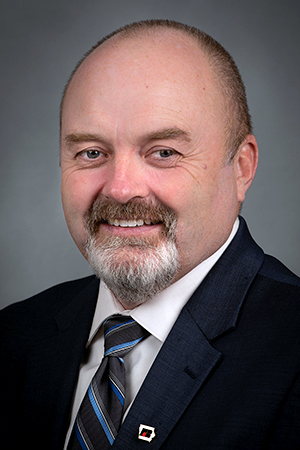
Brent JohnsonPresidentBrent Johnson of Manson was elected president of the Iowa Farm Bureau Federation (IFBF) in December 2021.
Johnson's long-time service to agriculture and Farm Bureau started at the county level, where he held several positions with the Calhoun County Farm Bureau board of directors, including president and voting delegate. He previously served as IFBF's Young Farmer Committee Chair and was first elected as the district 4 representative to the state board of directors in 2016. He also served as the Calhoun County Soil and Water Commissioner.
He is the 2020 recipient of the Iowa Department of Agriculture and Land Stewardship Environmental Leader Award, the 2014 Renew Rural Iowa Award winner, the 2009 Outstanding Young Farmers National Award winner and the 2007 IFBF Young Farmer Achievement Award winner.
Johnson earned a Bachelor of Science degree in Agronomy from Iowa State University (ISU) and has specialized in precision agriculture, previously working as an agronomist and certified crop advisor. In 2006, Johnson founded an independent crop consulting business, utilizing cutting edge technology to advance soil health and data management. Brent is comfortable at the leading edge. He was heavily involved in a leading corn breeding company while researching and implementing the first biotech traited corn hybrids, he has helped several equipment manufacturing companies refine equipment to make it more efficient or suitable for farmers, and even collaborated with international drone companies to help them understand how the electromagnetic spectrum can help farmers better refine fertilizer applications for farmers.
Johnson farms with his wife, LuAnn, son, Matt, and daughter-in-law Rebekah. He grows corn and soybeans on their Calhoun County farm. He and LuAnn also have a daughter, Kaeli, and two grandchildren.
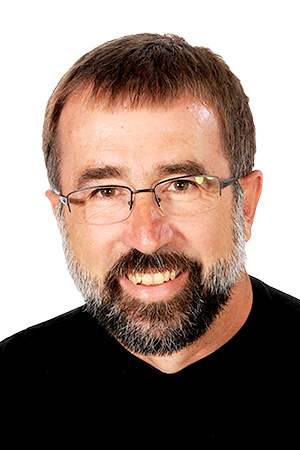 ex-officio
ex-officio
Kendall R. Lamkey, Ph.D.Associate Dean, College of Agriculture and Life SciencesKendall R. Lamkey is the Associate Dean of the College of Agriculture and Life Sciences at Iowa State University. He earned his B.S. and M.S. degrees from the University of Illinois and his Ph.D. degree from Iowa State University in plant breeding and genetics.
Lamkey provides leadership and direction to the department in the areas of education, research, and extension. He advocates for and sets priorities for the academic and research portfolio of the department through shared governance with the faculty. In cooperation with Associate Dean for Extension and Outreach in the College of Agriculture and Life Sciences, he sets priorities for extension and outreach in crops, soils, and climatology. Lamkey has the responsibility of representing the department as he interacts with public in Iowa and at the national and international level. He is responsible for understanding and articulating the broad education, research, and extension capabilities of faculty in the department. Lamkey is responsible for overseeing the departmental budget, evaluating faculty, setting salaries, hiring faculty, and providing faculty, staff, and students with the support they need to be successful. He provides leadership in the expenditure of earnings from our endowments, which total around $2.5 million per year.
Lamkey's research program focuses mainly on corn breeding with an emphasis on the quantitative genetics of selection response, inbreeding depression and heterosis. Lamkey has served on the advisory board for Makerere University Regional Center of Excellence in Crop Improvement (MaRCCI), Kampala, Uganda since 2018. Lamkey has been involved in the gates funded project Plant Breeding Education for Africa (PBEA). One of Lamkey's current interests is cropping systems models such as APSIM and how to account for genetic changes in cultivars overtime in these models.
Lamkey has authored or co-authored 81 refereed journal articles and numerous papers in conference proceedings, book chapters, published abstracts, and technical research reports. Lamkey has been active in graduate education at Iowa State University and has served as major advisor for 18 Ph.D. students and 10 M.S. students and has served on the program of study committee for more than 80 M.S. and Ph.D. students
Lamkey is a fellow of the American Society of Agronomy and the Crop Science Society of America and has served as an associate editor, technical editor, and editor for Crop Science.
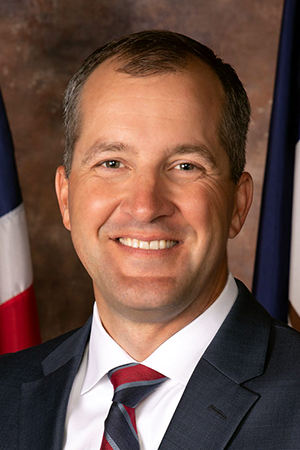
Michael NaigSecretary of AgricultureSecretary Mike Naig was elected to lead the Iowa Department of Agriculture and Land Stewardship in 2018. Through its 12 diverse bureaus, the Department ensures animal health, food safety and consumer protection. It also promotes conservation efforts to preserve our land for the next generation. Naig and his wife, Jaime, have three boys and they spend as much time as possible on their family's Century farm located in Palo Alto County, Iowa.
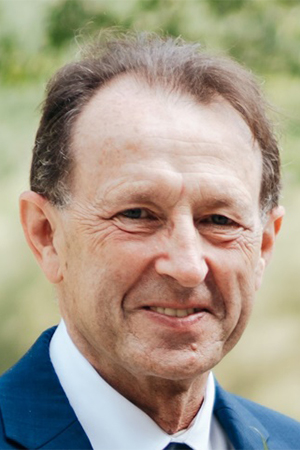
Ray Riley, Ph.D.President, RDR AgriscienceNorth America Lead, Loam BioRay is currently North America Lead and Management Team member of Loam Bio, an Australian based startup focused on enhancing the sequestration of recalcitrant carbon in agricultural soils at scale through microbial seed treatments used across production agriculture systems. Ray also serves as President of RDR Agriscience which provides consulting services to Ag Tech startups spanning crop genetics, gene editing, seed business strategy, biotech and natural disease control mechanisms for human and animal health.
Ray started his career at Pioneer Hi-Bred where he spent 10 years as a corn breeder followed by 10 as a Research Director leading various programs including Corn Breeder in Latin America, Africa, and Asia, research strategy and R&D process change. Ray joined Syngenta when it was created in 2000 as Global Head of Corn Seed Supply Chain where he focused on improving seed supply chain efficiencies. In 2004 he returned from Europe to support Syngenta's due diligence, acquisition and integration of several seed companies and research assets. As Global Head of Corn and Soybean Seeds R&D from 2004 thru 2011 he established an integrated research team and oversaw the company's corn and soybean Breeding Strategy and Seed Technology efforts. From 2011 thru 2014 Ray lead Syngenta's Traits Research and Germplasm Technology efforts and in 2014 Ray was named Head of Computational Biology, where he established an integrated team supporting Syngenta's genetics and computational biology efforts spanning plant breeding, trait development (GM and native) and chemistry. In 2015 Ray moved from the large corporate R&D arena to the Ag Tech startup area when he joined Indigo Ag as Sr VP Product Development. There he supported the company's growth from a early stage research focused organization with less than 20 employees to a product and brand focused organization with over 1000 employees.
He holds M.S. and Ph.D. degrees in Plant Breeding and Genetics from the University of Nebraska as well as short course MBA from Purdue University and he continues to be actively engaged with farming operations at the family farms in Wisconsin and Iowa.
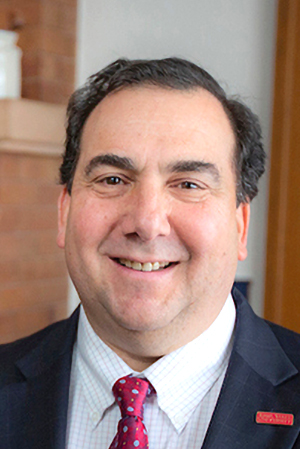 ex-officio
ex-officio
Daniel J. Robison, Ph.D.Endowed Dean, College of Agriculture and Life SciencesDaniel J. Robison began his tenure as Dean, Endowed Chair, of the College of Agriculture and Life Sciences at Iowa State University, Ames, Iowa in January 2019. He also serves as director of the Iowa Agriculture and Home Economics Experiment Station. Following a national search, he was announced as the 11th dean in the history of Iowa State's agricultural college in October 2018.
The College includes approximately 4,500 students, 15 academic departments, and 600 faculty and staff. The College has a network of farm and field stations around the state – including new capacities in livestock, grain processing and biorenewables; extensive laboratory and greenhouse facilities; collaborative federal laboratories; Extension and outreach activities in all 99 Iowa counties; and about $60 million in annual research activity. There are also satellite campus facilities in Uganda, the US Virgin Islands, and Montana. Major initiatives in global engagement, innovation and entrepreneurship, sustainability, and agricultural vitality and food systems are continually being advanced. The college has key partnerships with public and private sector interests across the agricultural sector, and includes work in natural resources, technology, and life and social sciences.
Robison came to Iowa State from West Virginia University, where he served 2012-2019 as the dean and experiment station director of the Davis College of Agriculture, Natural Resources and Design. Prior to that position, Robison served on the faculty at North Carolina State University for 16 years, where he directed the Hardwood Research Cooperative working with forest products industries and agencies across the South. He completed his tenure at NC State as professor and associate dean of research in the College of Natural Resources. Prior to NC State he worked on the faculty at the State University of New York College of Environmental Science and Forestry-Syracuse (SUNY ESF), and in a variety of capacities while in residence in Cote d'Ivoire West Africa.
Robison, a forester and forest entomologist by discipline, has published and presented, and trained graduate students in the areas of forest entomology and pest management, silviculture of natural hardwoods, biomass-bioenergy plantation systems, agroforestry and clonal forestry. His international experience includes two years in West Africa as a consultant and volunteer for the West Africa Rice Development Association, African Development Bank, U.S. Peace Corps, and Agency for International Development. He has also done field work in countries that include Canada, Myanmar, Israel and South Africa.
Robison earned a doctorate in entomology from the University of Wisconsin-Madison in 1993. He earned a master's degree in silviculture and forest influences in 1986 and a bachelor's degree in forestry in 1982, both from SUNY ESF. He was a Fellow of the American Council on Education 2007-2008, with service at University of Alaska-Fairbanks, and East Carolina University.
Robison is a native of New Jersey. He and his wife Julie, a native of Wisconsin, have two daughters.

Patrick S. Schnable, Ph.D.Director, Plant Sciences InstitutePatrick Schnable manages a research program that emphasizes interdisciplinary approaches to understanding plant biology. His own expertise is in the areas of genetics, molecular biology, genomics, bioinformatics, and high-throughput phenotyping but he collaborates with researchers in diverse fields, including agricultural and computer engineering, plant breeding, statistics and soil science. He is the director of the Plant Sciences Institute, and under his direction, the Plant Sciences Institute's Faculty Scholars are pursuing unique interdisciplinary approaches to the field of predictive plant phenomics.
Dr. Schnable's scientific investigations of the maize genome have been wide-ranging and he has developed and/or deployed a number of important genomic tools and resources. However, the focus of his PSI project is on constructing and deploying new sensors and robots to facilitate the automated collection of the large volumes of phenotypic data at multiple locations needed to develop an understanding of GxE interactions. For example, networked systems of hundreds of computer-controlled cameras that enable high-throughput, high-resolution, field-based time-lapse photography for studying maize growth/development and responses to environmental stresses have been deployed at multiple locations over multiple years.

David Skibbe, Ph.D.Head of Trait Design and Generation & Herbicide Trait Science LeadDavid Skibbe, Syngenta Fellow and Herbicide Trait Research Team Lead, is responsible developing and delivering the Herbicide Trait strategy at Syngenta Crop Protection, LLC, in Durham, NC. In his current role, David coordinates cross-organization global team of chemists, molecular biologists, plant biologists, plant physiologists, and agronomists to deliver Syngenta's herbicide trait product concepts.
David joined Syngenta in 2010 as a trait scientist in the Event Selection team in Bloomington, IL where he supported corn and soybean herbicide trait projects. In 2012 he moved to Stanton, MN to support the global corn R&D and P&S organization by applying field genetics and lab-based 'omics approaches to improving corn parent inbred traits that affect cost of goods produced and yield. He relocated to Durham, NC in 2017 to lead a team of highly skilled scientists to develop across crop fit-for-purpose phenotype-to-genotype and genotype-to-phenotype solutions for breeding and production ranging using expertise ranging from the lab bench to the field. Additional assignments included leading the Global Quality and Agronomic Traits Group and the Seed and Quality Traits Research Program. His internal accomplishments include winning the company-wide 2019 Science & Technology Prize for Innovations in Maize Transformation and 2022 Team First Prize for Advances in Germplasm x Environment x Management x Microbiome in the New Opportunities across Syngenta Divisions category.
He holds a B.S. in Biology degree from Truman State University and a PhD in Molecular, Cellular and Developmental Biology from Iowa State University. He was a Ruth L. Kirschtein Post-Doctoral Fellow in Virginia Walbot's laboratory at Stanford University, where he was an author on 10 scientific articles.
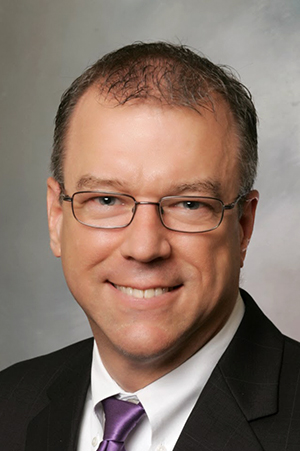
Rod WilliamsonDirector, Research and DevelopmentRod serves as the Director of Research and Development for Iowa Corn. This involves funding research initiatives, negotiating research and license agreements, developing a patent strategy, and commercializing new technology for biofuels, bioproducts and biotechnology. In addition, Rod was instrumental in developing a strategy and securing the funding for the National Plant Genome Initiative funded by the federal government and subsequent efforts with the Genome to Phenome Initiative.
Rod Williamson grew up on a grain, livestock and dairy farm in southwest Iowa. Rod received his bachelor's degree from Iowa State University in Agricultural Mechanization. While he was in school he was owner and operator of a custom farming business baling hay and corn stover.
After graduation, Rod started working in sales and marketing for the Iowa Corn Growers Association and Iowa Corn Promotion Board. Rod then became involved in policy as a lobbyist for the organization dealing with the state and federal policy makers.
The Iowa Corn Promotion Board is a non-profit organization that invests the one cent per bushel checkoff into market development, research and education programs related to corn. The Iowa Corn Growers Association is a membership organization that lobbies on policy issues impacting the market for corn.